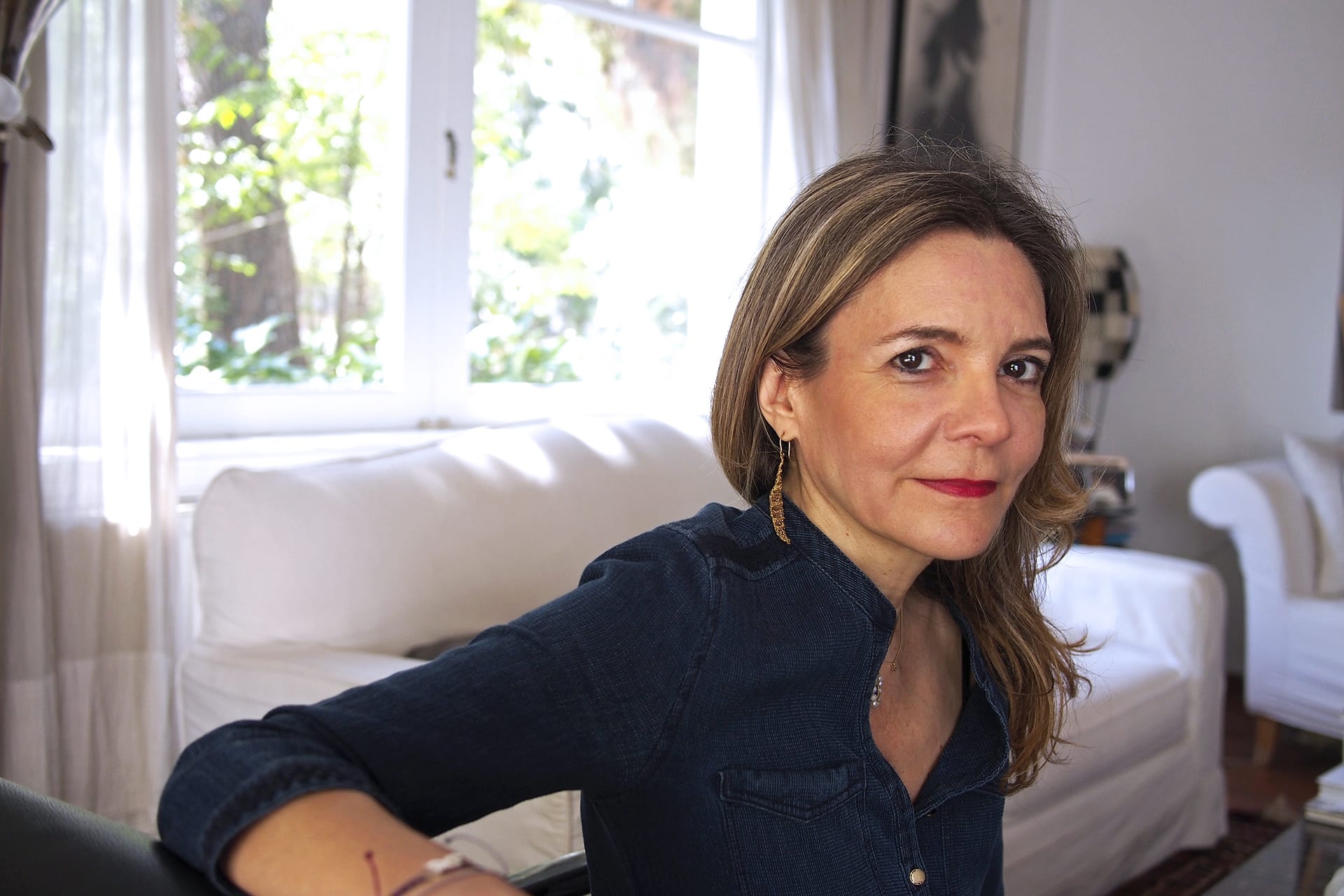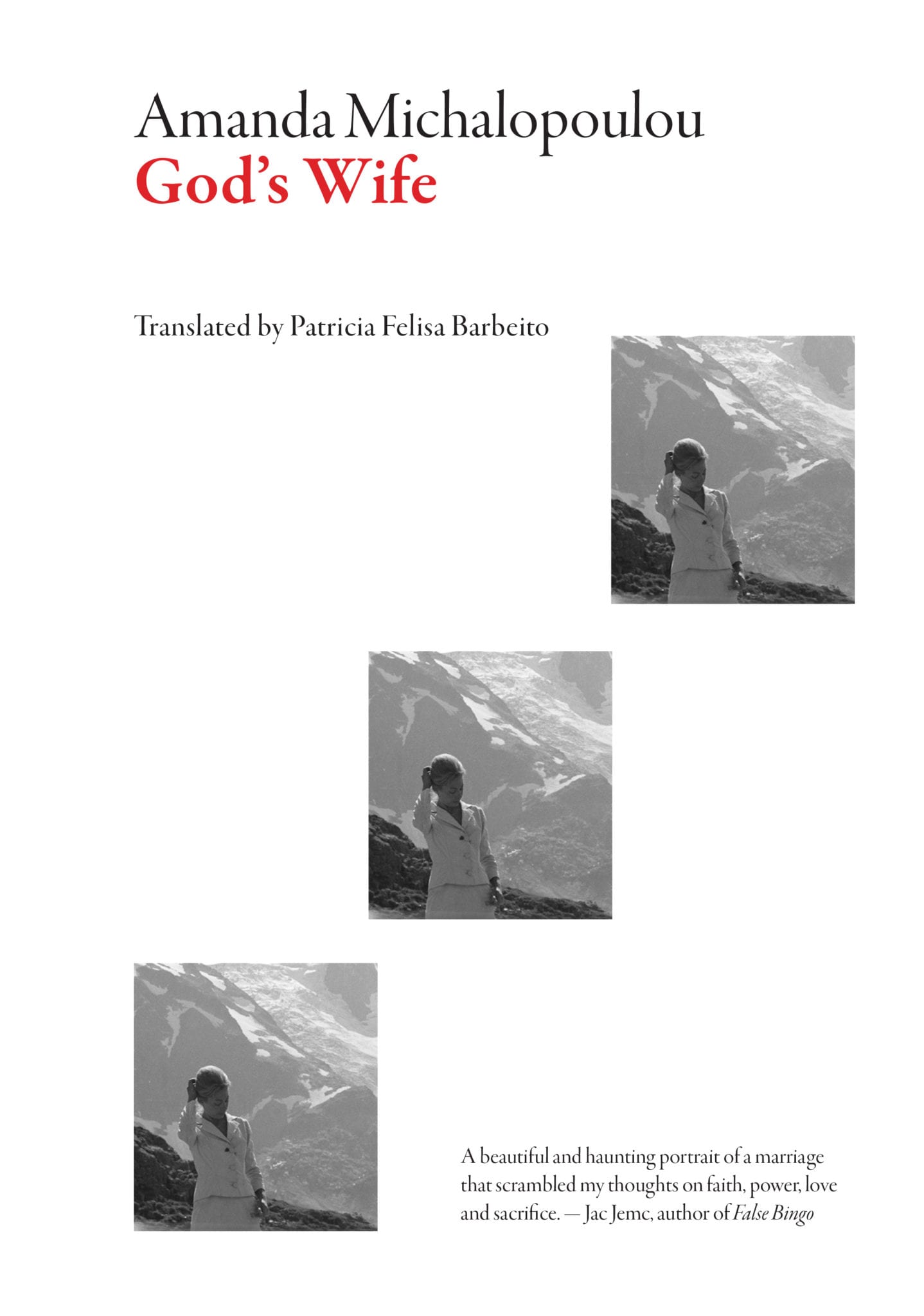
By Claudia Acevedo
In her latest novel to be translated into English, God’s Wife (Dalkey Archive), Amanda Michalopoulou – one of Greece’s most highly acclaimed contemporary writers – deftly straddles the line between literal and metaphorical, producing something that is equal parts love story, fairy tale, dystopia, and philosophical treatise. Originally published in 2014, and now translated by Patricia Felisa Barbeito, the book is an unnamed protagonist’s account of her experiences as the ultimate creator’s companion. The Wife’s open letter tells the story of an impossible marriage—sometimes joyful, often miserable, always sexless, always full of questions. But it also serves as her coming-of-age in writing. As the reader, we are compelled to follow the Wife through time jumps and physical, spiritual, and intellectual travails. So much of her story is about asking the questions that we all spend our lives trying to answer, about the nature of creation and love. When I interviewed Michalopoulou by email this past May, we discussed everything from heretic female mystics, to mind circuses, to how abandonment engenders art. Our conversation is a window into the making of this strange, important novel, written in and about a space that Anne Carson calls “that emptiness where God would be if God was available, but God isn’t.”
 How did this concept come to you? Was there an event/text/film, or combination of those that compelled you to write the book as a long letter?
How did this concept come to you? Was there an event/text/film, or combination of those that compelled you to write the book as a long letter?
I honestly don’t know. The idea of the Virgin Mary obviously played a role in it, though. From a very young age I was puzzled by the concept of the Immaculate Conception, a woman who is chosen for reproduction through an accelerated, mechanical procedure presented as Grace. I thought that God deserved another kind of woman, one who is probably naive and obedient in the beginning—this is how she is at 17 after all, when they meet in the book—but grows older and stranger because of her peculiar fate to be God’s Wife, and then reclaims her right to happiness ever after.
Were there any written testimonies by women (or men) that you were influenced by or interested in while working on the novel?
Marguerite Porete, mainly, this medieval mystic who was burned for heresy in 1310 after refusing to withdraw her book, “The Mirror Of Simple Souls,” from circulation. And Simone Weil, for her idea that creation occurred when God withdrew. Anne Carson brilliantly spoke about the same thing: “that emptiness where God would be if God was available, but God isn’t.” A frustrating, nauseating idea of abandonment.
Did the structure of the book come first (Inferno, Purgatorio, Paradiso), or was it the other way around?
Structure always comes afterwards for me. In the beginning all is wild creation, a real cosmogony. It was especially the case with this novel because of its subject matter, which is, among other things, our place in the world and how this world of ours is created. This is even when we are talking about a solipsistic world, a concept we create to live and dream within our heads.
I am dreaming of a reader who would play with all of this, someone who is more like a juggler, really. Reading novels is, after all, a daring circus show for the mind and the soul.
Is there one thing that you want your reader to take away from the work? Or is the act of writing the point?
I hope there are many things that work simultaneously, subplots that work in unison in the mind of the reader, the same way an orchestra produces sounds, and, hopefully, a melody. God’s wife wants to write her own version of the marriage and God is terrified by the idea of a testimony being written at all, as He is tremendously introspective and afraid of critique.
I guess a writer will read the book as a metaphor about writing and responsibility, and someone who suffers from a broken heart will read more into the devastation of this archetypical love affair. A feminist would recognize the woman’s oppression, and a psychoanalyst would probably talk about hysterics—who knows? I am dreaming of a reader who would play with all of this, someone who is more like a juggler, really. Reading novels is, after all, a daring circus show for the mind and the soul. You do so many things simultaneously by reading, appropriating, interpreting, enjoying.
Could you talk about the importance of love in the book? Or, if not of love, marriage? In other words, why is the main character God’s “wife,” as opposed to his friend or disciple?
Oh, but this is about love, about falling in love in admiration. I was very tempted to describe this kind of love, which can’t be physical. God doesn’t have a body, He is only soul. If I chose to make the narrator a friend or disciple there wouldn’t be the kind of tension that is created by physical rejection. And then it was interesting to think about how that bitterness and dismay end up creating real existential resentment over the years. The marriage is obviously unhappy, and the wife’s way to survive is to write a book about it. But God has other plans.
Could you talk about the research process for God’s Wife? I learned a lot about astrophysics, philosophy, and literature reading this. It felt very “filling,” and like a lot of work, to put it mildly. Why did you choose the poets you quoted?
During the years I wrote the book I read a lot, as always. Whatever I found interesting, like poems and theories, I set aside to use. I was trying to follow the way of thinking of a woman who is discovering the world through reading. That was her “university course.” It was at first encouraged by God, and then slowly taken away when the Wife became too inquisitive, too “educated” about the nature of the world, the nature of knowledge. I would like the reader to follow her in this education, to ask the same questions, to see her grow as she desperately inquires about the world.
How many years did you spend writing God’s Wife?
I fully read for two years, it was an education! And afterwards, the writing was broken up into two parts. One part was written in Greece and Italy when I took part in the Bogliasco Residency in 2012, and the next one was written in China in 2013, thanks to a Shanghai Writers Association Residency. I mention these places because they are crucial settings in the novel. When God and His wife return to the world they go first to a place that resembles China, and then to a place in the Mediterranean that had a lot in common with the Italian coastline.
I feel as though there are, at least, two ways to read the book. How many are there?
It can be read as a romantic fairy tale for grown-ups, as a thriller of sorts, as a dystopia (a woman imprisoned in her own book, living and ruminating in her story). It can also be read as a bildungsroman about a girl who finally becomes a woman, or as a philosophical novel about the nature of the world. Or as all of the above and more.
Writing is my religion. It shaped my faith in the unknown, in the magical. It reconciled me with life and death. I was an introspective child, and books provided me with hope and solace.
If it’s not too intrusive, could you talk about the ways in which religion and writing intercept and relate to one another in your own life?
Writing is my religion. It shaped my faith in the unknown, in the magical. It reconciled me with life and death. I was an introspective child, and books provided me with hope and solace. Literature is, for me, pure metaphysics; it starts with suspension of disbelief (what a miracle!) and gradually it gives meaning to life, by giving meaning to a certain story. It is a constant ritual and a rite of passage. It has ethics, it has hymns and commandments, fear and gratification; who could ask for more, religion-wise?
Did writing God’s Wife answer any questions you may have had when you started it? If so, which were they?
I believe we write books to ask questions, not to answer them. My intention for writing a novel is to ask better, to ask fearlessly, unflinchingly. In this sense my questions remain and run deeper. How to create as a woman today, how to understand sexuality and passion and rejection and survive it and think for yourself, stubbornly, heartfully.
Amanda Michalopoulou is the internationally acclaimed author of several books of fiction, two of which have previously been published in English: I’d Like (Dalkey Archive Press, 2008) and Why I Killed My Best Friend (2014), both translated by Karen Emmerich. Her work, which has been translated into twenty languages, has been awarded the Diavazo Novel Prize, the Academy of Athens Award, and the International Literature Award by the National Endowment for the Arts among others. She lives in Athens, Greece.
